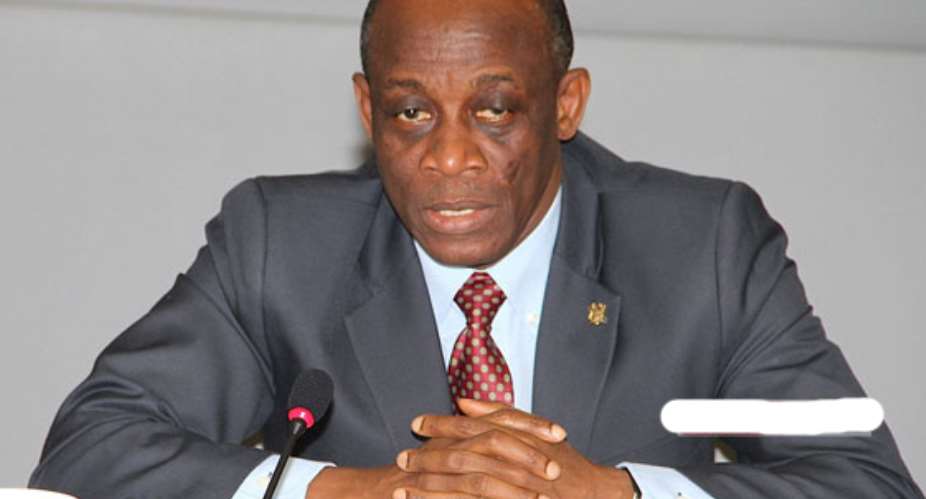Seth Terkper, Finance Minister
Government says its efforts at reducing fiscal deficit have been slow because of a number of setbacks including the two-year disruption of gas supply.
The decline in gold and cocoa prices affected government revenue, and additionally the projected fall in oil prices is having negative effects on the economy, it said.
Government said it has pinned its hopes on additional measures and reforms outlined in the 2015 Budget to help address the numerous problems.
Seth Terkper, Finance Minister, who made this known during a presentation on the state of the economy yesterday in Accra, said discipline was very crucial to government's plans to achieve its targets.
Mr Terkper said government expects fiscal and current account deficits to reduce to 3.7 percent and 4.9 percent respectively in 2017.
These, he said, were expected to increase reserves to cover 4.2 months of goods and services.
Noting that government expected the country's economic growth to pick up over the medium term to 9.2 percent in 2017 with inflation reducing to 8.2 percent, he mentioned: 'It is either we discipline ourselves or dissipate the opportunities that will arise when the economy shows any gain.'
Medium Term Prospects
The Finance Minister said the economy has very bright medium term prospects, supported by an expanded services sector, discovery of more oil and gas fields (TEN and Sankofa) and the coming on stream of the country’s own gas processing plant.
He said government recognizes the importance of addressing the short-term challenges facing the economy in order to safeguard the bright prospects of the country's economy.
Financing Projects
Mr Terkper said government, through Cabinet, has agreed to use 50 percent of the Stabilization Fund to support the budget after revenue shortfalls because of the declining prices of Ghana's exports.
The minister said government will now rely on bonds and banks that can provide long-term financing of projects.
He said commercial projects should make enough profit to pay for the loans used to fund them, stating that 'Getting the taxpayer to pay for these loans is not a desirable option any longer.'
The Minister said henceforth government will also start paying the principal of loans and stop waiting for the loans to mature before payment.
By Cephas Larbi
[email protected]





 Akufo-Addo commissions Phase II of Kaleo solar power plant
Akufo-Addo commissions Phase II of Kaleo solar power plant
 NDC panics over Bawumia’s visit to Pope Francis
NDC panics over Bawumia’s visit to Pope Francis
 EC blasts Mahama over “false” claims on recruitment of Returning Officers
EC blasts Mahama over “false” claims on recruitment of Returning Officers
 Lands Minister gives ultimatum to Future Global Resources to revamp Prestea/Bogo...
Lands Minister gives ultimatum to Future Global Resources to revamp Prestea/Bogo...
 Wa Naa appeals to Akufo-Addo to audit state lands in Wa
Wa Naa appeals to Akufo-Addo to audit state lands in Wa
 Prof Opoku-Agyemang misunderstood Bawumia’s ‘driver mate’ analogy – Miracles Abo...
Prof Opoku-Agyemang misunderstood Bawumia’s ‘driver mate’ analogy – Miracles Abo...
 EU confident Ghana will not sign Anti-LGBTQI Bill
EU confident Ghana will not sign Anti-LGBTQI Bill
 Suspend implementation of Planting for Food and Jobs for 2024 - Stakeholders
Suspend implementation of Planting for Food and Jobs for 2024 - Stakeholders
 Tema West Municipal Assembly gets Ghana's First Female Aircraft Marshaller as ne...
Tema West Municipal Assembly gets Ghana's First Female Aircraft Marshaller as ne...
 Dumsor is affecting us double, release timetable – Disability Federation to ECG
Dumsor is affecting us double, release timetable – Disability Federation to ECG
